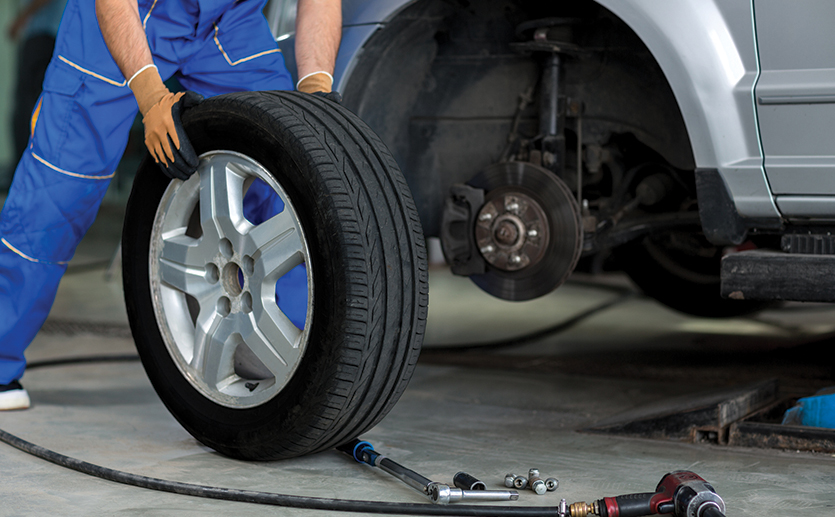Morris Tires: Your Location for GMC Tires Service Excellence
Morris Tires: Your Location for GMC Tires Service Excellence
Blog Article
Tire Service: The Impact of Weather
When it involves ensuring optimal performance and safety and security on the roadway, recognizing the influence of climate problems on tire service is vital. From scorching warmth to icy roads, each climate aspect can substantially affect tire functionality and overall driving experience. By diving right into the impacts of differing weather conditions on tires, chauffeurs can acquire important insights that may enhance their vehicle's efficiency and durability. In this conversation, we will certainly check out the elaborate relationship between climate problems and tire solution, losing light on the value of weather-specific tire upkeep practices and factors to consider.
Warm and Tire Performance
When subjected to high temperature levels, tires experience adjustments in efficiency that can dramatically influence automobile security and handling. The heat generated from long term driving or warm climate problems causes the tire rubber to soften, leading to lowered tread life and raised wear.

Cold Weather Condition Impacts
Cold weather problems can have a significant influence on tire performance and safety and security. In chilly climate, tires might likewise shed air pressure extra rapidly, which can influence dealing with and gas efficiency.
To alleviate the effects of winter on tires, it is crucial to frequently check tire stress and inflate them to the maker's suggested levels. Using winter months or all-season tires made for cool climate conditions can also boost traction and grip on icy or snowy roadways. Correct tire maintenance, including routine inspections for wear and damage, ends up being much more crucial throughout chillier months to ensure ideal efficiency and security.
Rainy Issues Influence
Tires with damaged footsteps are extra vulnerable to hydroplaning, where a layer of water builds up between the road and the tire surface area, leading to loss of grip. To combat this, drivers must on a regular basis inspect their tires for appropriate tread deepness and consider investing in tires especially created for wet conditions.
In addition, rainy weather condition can additionally decrease exposure, making it testing for motorists to see the road ahead plainly (GMC Tire Service). In such conditions, it is important to change driving rates as necessary and preserve a secure following range to permit unexpected stops. Properly inflated tires can additionally assist in keeping control on damp roadways by providing much better handling and grip
Snow and Tire Safety And Security
Snow-covered roads pose distinct obstacles for motorists, stressing the significance of proper tire selection and maintenance. When driving in snowy problems, having the best tires can make a significant distinction in safety and security and performance. Winter months tires are designed with special rubber compounds and step patterns to offer much better grip on snow and ice contrasted to all-season tires. The deeper treads and sipes of wintertime tires aid grip the road much better, reducing the risk of sliding and slipping.

It is vital to follow maker directions when making use of and mounting tire chains to protect against damages to the tires and lorry. By choosing the best tires, maintaining appropriate rising cost of living, and taking into consideration additional grip aids like tire chains, drivers can boost their security when navigating snow-covered roads.
Weather-Related Tire Maintenance
When faced with different climate condition, appropriate tire upkeep becomes an essential element of lorry security and performance. Weather-related tire upkeep encompasses a variety of methods focused on making sure optimum tire feature and longevity in different climate scenarios. One vital aspect of weather-related tire maintenance is tire stress policy. Varying temperatures can create tire pressure to differ, influencing traction and gas effectiveness. Routinely readjusting and examining tire pressure according to producer recommendations is vital for risk-free driving in gmc tires altering weather problems. Additionally, tire tread depth plays a substantial role in dealing with different climate aspects. Tires with appropriate tread deepness provide better grasp on damp or icy roadways, lowering the threat of hydroplaning or skidding. Inspecting tire walk consistently and replacing tires when step wear gets to a certain depth is crucial for preserving grip and security in damaging weather condition. By focusing on weather-related tire upkeep, drivers can improve safety, boost vehicle performance, and extend the lifespan of their tires.
Conclusion
In verdict, climate condition have a significant influence on tire performance and safety and security. From warmth impacting tire pressure and use to winter decreasing grip, it is important to take into consideration the weather when maintaining and making use of tires. Wet problems can lower hold and bring about hydroplaning, while snow can increase the risk of mishaps if tires are not correctly outfitted. Weather-related tire maintenance is critical in making certain ideal efficiency and safety and security when traveling.
In this discussion, we will certainly discover the elaborate connection in between weather conditions and tire solution, dropping light on the significance of weather-specific tire upkeep techniques and factors to consider.

Report this page